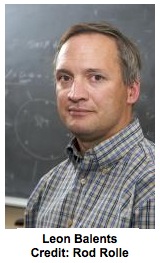 UCSB Physicists Make Strides in Understanding Quantum Entanglement
UCSB Physicists Make Strides in Understanding Quantum Entanglement
December 14, 2012
(Santa Barbara, Calif.) –– While some theoretical physicists make predictions about astrophysics and the behavior of stars and galaxies, others work in the realm of the very small, which includes quantum physics. Such is the case at UC Santa Barbara, where theoretical physicists at the Kavli Institute for Theoretical Physics (KITP) cover the range of questions in physics.
Recently, theoretical physicists at KITP have made important strides in studying a concept in quantum physics called quantum entanglement, in which electron spins are entangled with each other. Using computers to calculate the extreme version of quantum entanglement –– how the spin of every electron in certain electronic materials could be entangled with another electron's spin –– the research team found a way to predict this characteristic. Future applications of the research are expected to benefit fields such as information technology.
"Quantum entanglement is a strange and non-intuitive aspect of the quantum theory of matter, which has puzzled and intrigued physicists since the earliest days of the quantum theory," said Leon Balents, senior author of a recent paper on this topic published in the journal Nature Physics. Balents is a professor of physics and a permanent member of KITP.
